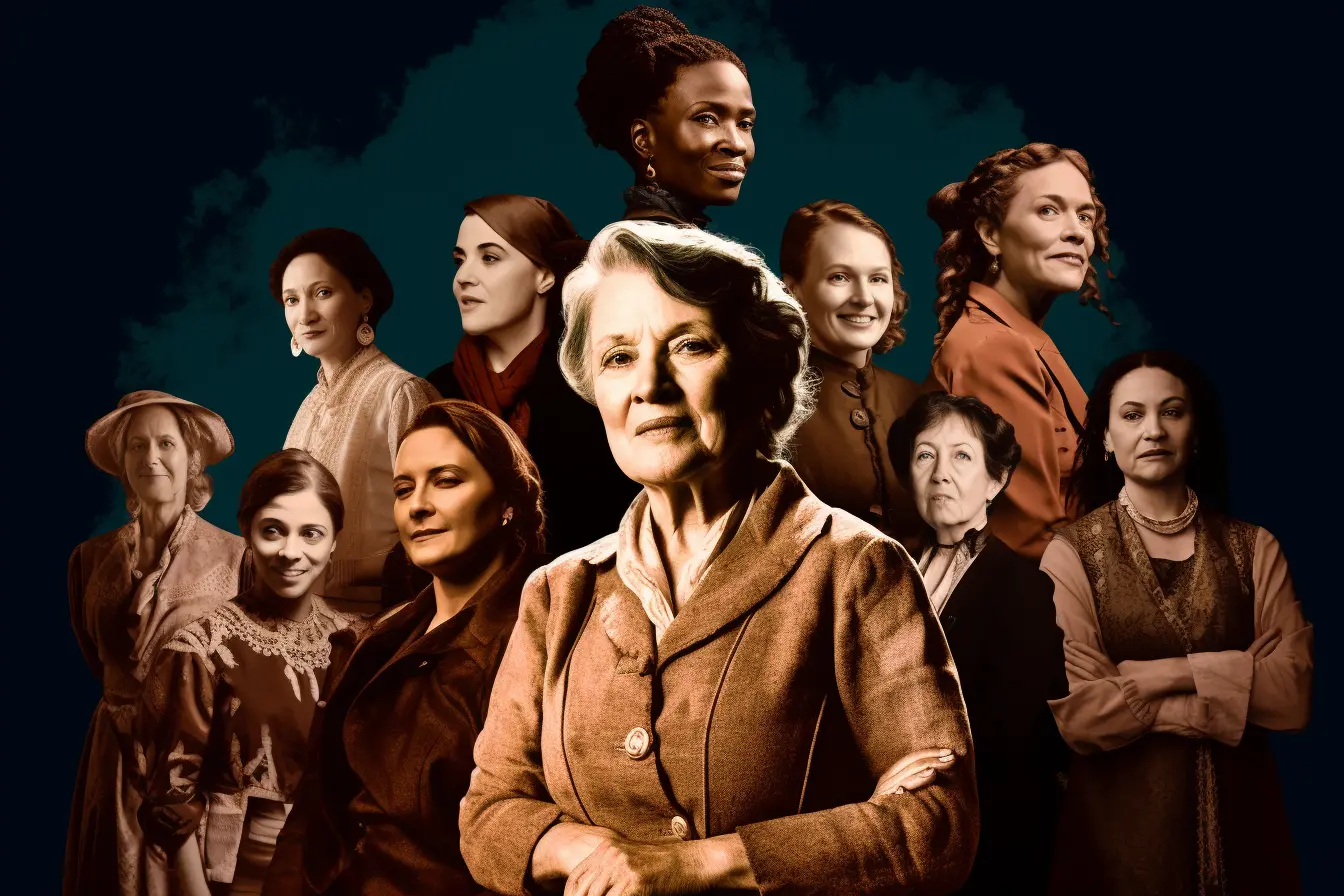Introduction: Setting the Stage for Unsung Heroines
When one flips through the pages of history books, it’s evident that the annals are replete with tales of male heroes. Wars won, nations built, and revolutions led are predominantly attributed to men. But where are the women in these stories? Particularly, where are the women who shaped the course of feminist history?
The feminist movement, spanning centuries and continents, is a tapestry woven with countless stories of courage, resilience, and change. And yet, only a few names—like Gloria Steinem or Betty Friedan—have made it to the forefront. But what about the countless other women? The unsung heroines who, from the shadows, propelled the movement forward?
This article is a tribute to these overlooked pioneers. A journey into the depths of history to rediscover and celebrate these women. Their stories, though less known, are equally pivotal. As we traverse this journey, let’s give these women the recognition they’ve long been denied and celebrate their indomitable spirit.
The Dawn of Feminist Activism: Early Women Pioneers
Much before feminism became a widespread movement, before the term even existed, there were women who challenged the status quo. These women, though separated by centuries and continents, shared a common trait—a vision for a world where women were treated as equals.
Consider Christine de Pizan. In the medieval era, when literature was rife with misogyny, she stood out as a beacon of resistance. Through her writings, she challenged prevailing notions, laying the groundwork for future feminist thought. Another trailblazer was Sor Juana Inez de la Cruz. In the 17th century, when women were expected to remain confined to domestic spheres, she championed the cause of women’s education.
These early pioneers, though they might not have termed themselves as feminists, embodied the spirit of the movement. Through their actions and writings, they sowed the seeds for future generations, paving the way for a more egalitarian world.
The Shadows Behind Big Names: Women Who Paved the Way
For every monumental moment in history, there are countless unsung heroes. The feminist movement is no exception. Behind the iconic marches, speeches, and protests, were women whose efforts often went unrecognized. Their contributions, though less celebrated, were fundamental to the movement’s success.
Take the suffragette movement, for instance. While figures like Emmeline Pankhurst are celebrated for their leadership, many played crucial roles behind the scenes. Women like Sophia Duleep Singh, a princess by birth, not only participated in marches but also worked tirelessly to mobilize women of color. Her efforts ensured that the movement was inclusive and represented the voices of all women.
Such stories serve as a reminder that history is not just made by those in the limelight. The collective efforts, the tireless work of many, shape the course of movements, ensuring their success and longevity.
Global Perspectives: Feminist Leaders Beyond the West
Feminism, contrary to popular belief, isn’t a Western construct. Across the world, in diverse cultures and settings, women have risen to challenge patriarchal norms. Their struggles, though unique in context, resonate with the core tenets of feminism—equality and justice.
In India, Savitribai Phule took on the dual oppressions of caste and gender. By establishing schools for girls, she not only championed education but also laid the groundwork for future feminist movements in the country. Meanwhile, in Egypt, Huda Sha’arawi’s act of removing her veil was a symbol of resistance. It wasn’t just about a piece of cloth, but a challenge to societal norms that sought to confine women.
These stories emphasize the universality of the feminist struggle. While the contexts varied, the essence remained consistent—a quest for a world where women enjoyed equal rights and opportunities.
Fighting Against Double Oppression: Women of Color in Feminism
The feminist movement, while monumental in its impact, has often been critiqued for its lack of inclusivity. For women of color, the struggle for gender equality is intertwined with the fight against racial discrimination. Their journey within the feminist movement has been one of battling double oppressions.
Ida B. Wells, an African American journalist and activist, exemplifies this dual fight. Not only did she campaign against lynching, bravely exposing racial violence in the American South, but she also was a staunch advocate for women’s suffrage. Her activism was a testament to the interconnectedness of gender and racial justice. Another figure, Yuri Kochiyama, bridged the gap between the civil rights movement and feminist activism. Her work emphasized the importance of solidarity across different movements.
These women of color didn’t just participate in the feminist movement; they enriched it. Their perspectives, rooted in their unique experiences, added depth to the discourse on equality, making it more holistic and inclusive.
The Power of Grassroots: Local Leaders with Global Impact
Movements aren’t just shaped by grand gestures or global conferences; often, the most profound change starts at the grassroots. These local endeavors, though smaller in scale, ripple outwards, influencing communities and, eventually, the world.
Take Wangari Maathai, for instance. In Kenya, she initiated the Green Belt Movement, a grassroots initiative focused on tree planting. But it wasn’t just about combating environmental degradation. Through this movement, Maathai empowered women, offering them economic opportunities and amplifying their voices in community decision-making. Another example is the Gulabi Gang in India. This group of women, dressed in pink saris, took on gender violence in their communities, challenging deeply ingrained patriarchal norms.
These grassroots leaders, with their deep understanding of local issues, demonstrate that change doesn’t always start at the top. Sometimes, the most impactful revolutions begin in our own backyards.
Challenges and Triumphs: The Resilience of Forgotten Leaders
The path of activism is seldom easy. Advocating for change, especially in societies resistant to it, comes with its fair share of challenges. For many of our unsung heroines, these challenges were daunting, ranging from societal backlash to personal sacrifices.
One only needs to look at the story of Tarana Burke, the founder of the #MeToo movement. Long before #MeToo became a global phenomenon, Burke was working at the grassroots level, supporting survivors of sexual violence. Her journey was filled with challenges, from lack of resources to skepticism from larger society. Yet, she persevered, and her resilience led to a global reckoning on sexual harassment.
These stories of resilience are not just tales of individual triumphs but are emblematic of the collective spirit of the feminist movement. They remind us that, no matter the odds, with determination and unity, change is attainable.
The Legacy They Left Behind: Their Impact Today
As we trace the paths of these forgotten women leaders, it’s evident that their impact isn’t confined to history books. The freedoms and rights we enjoy today are, in many ways, a direct result of their struggles.
Take, for instance, the right to vote. This fundamental right, often taken for granted today, was the result of tireless campaigning by suffragettes worldwide. Or consider workplace rights. The ability for women to work without facing discrimination or harassment owes its genesis to activists who challenged biased workplace norms.
Recognizing the legacies of these women is essential. It not only offers us perspective on our present but also serves as a reminder of the sacrifices made to ensure a fairer world. As we benefit from their endeavors, it’s our duty to remember, honor, and continue their work.
The Importance of Remembering: Why Their Stories Matter
When history overlooks the contributions of certain individuals, it doesn’t just rob them of recognition; it deprives future generations of role models. The stories of these unsung heroines are not mere tales of the past; they are guiding beacons for the future. By unearthing and celebrating their stories, we not only correct historical oversight but also provide inspiration for future generations.
Moreover, these narratives challenge the monolithic portrayal of feminism. They remind us that the feminist movement was diverse, with contributors from various backgrounds, ethnicities, and ideologies. This diversity is its strength, and by recognizing all its contributors, we get a fuller, richer picture of the movement’s history.
Furthermore, their stories offer solace and inspiration. They remind us that change is possible, even against overwhelming odds. They serve as a testament to the human spirit’s resilience and the transformative power of collective action.
Continuing the Fight: Modern Feminism’s Debt to the Past
History isn’t just a record of the past; it’s a dialogue between generations. The struggles and triumphs of yesteryear’s feminists have laid the foundation for today’s battles. While the challenges faced by modern feminists might differ in context, the core essence remains the same: a quest for equality and justice.
The tools have evolved—social media campaigns have replaced pamphleteering, and global conferences have become significant arenas of change. But the spirit remains indebted to the pioneers. Their strategies, their sacrifices, and their successes offer valuable lessons.
By studying their journey, modern feminists can draw inspiration, avoid past pitfalls, and forge new paths. The dialogue between past and present is vital to ensure that the movement continues to evolve, adapt, and remain relevant.
Inspiring the Next Generation: Lessons from These Heroines
Every story carries a lesson, and the tales of these forgotten women leaders are no different. Their stories of courage, determination, and resilience offer invaluable insights. Whether it’s the unwavering commitment of women like Sojourner Truth or the strategic brilliance of figures like Fannie Lou Hamer, there’s much to learn.
These stories also serve as a tool for empowerment. When young girls hear tales of women who, despite all odds, made a significant impact, it instills a belief that they, too, can make a difference. It fosters ambition, nurtures determination, and kindles the flames of activism.
By ensuring these stories are told and retold, we not only pay homage to these heroines but also equip the next generation with the tools they need to shape the future.
Conclusion: A Tribute to the Forgotten Women Leaders
As we conclude this journey through the annals of feminist history, it’s clear that the movement is a rich tapestry woven with countless stories. Some are celebrated, while many remain in the shadows. But each thread, no matter how faint, is essential to the complete picture.
The unsung heroines of feminist history may not always find their names in textbooks, but their impact is undeniable. They have shaped cultures, transformed societies, and left an indelible mark on the world. As we move forward, it’s our responsibility to ensure their stories are told, their sacrifices are remembered, and their legacies are celebrated.
In paying tribute to these forgotten women leaders, we not only honor the past but also inspire future generations. After all, history is not just about remembering; it’s about taking the lessons of the past and using them to shape a brighter, more equal future.

